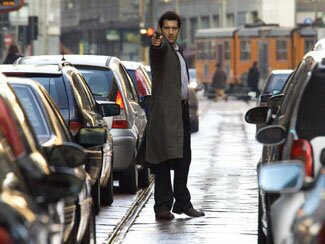MOVIE REVIEW- Art imitates: International intrigue conjures current crisis
 PUBLICITY PHOTO
PUBLICITY PHOTO
The International may be the first movie of the post-post-ironic age. The screenplay by Eric Warren Singer acknowledges the unstoppability of the economic forces that control our destiny, yet provides something of a catharsis at the end because "fiction has to make sense." Or because this isn't the ‘70s when movies could end on a downbeat, cynical note.
A "have it both ways" approach is evident throughout the picture, which boasts a number of crowd-pleasing elements, including skillfully staged action sequences and postcard views of five countries, yet also strains to be relevant and not insult the viewer's intelligence.
Perhaps the biggest cheat is the effort to create sexual tension between the leads, Louis Salinger (Clive Owen) of Interpol and Eleanor "Ella" Whitman (Naomi Watts) of the New York District Attorney's office, even though she's established as a contented wife and mother.
The screenplay manages to reduce the complexities of international banking and arms dealing to a level dummies can understand without making smarties feel talked down to. The relevance of money laundering by organized crime seems tangential, but perhaps that was the only way to make the case relevant to local authorities in New York.
Ella has been working for two years to bring down the International Bank of Business and Credit (IBBC). Louis left Scotland Yard two years ago after a flare-up over a related case and is now collaborating with Ella through Interpol. They're both workaholics, obsessed with prosecuting the IBBC, even though local authorities everywhere seem to be cooperating with the bank to stymie them.
Of immediate interest is the IBBC's attempt to purchase missile guidance systems. They're selling arms to small countries so those countries will be indebted to them. As someone explains, "The essence of banking is to make us all slaves to debt"– or something like that. It sounds like the thinking that brought on last year's crash, but it should still draw nods of assent from debt-slaves in the audience.
Anyone who threatens to expose the bank turns up dead, which adds up to quite a pile of bodies by the time the film ends with a montage of follow-up headlines.
Director Tom Tykwer, who proved he could make a movie move with Run Lola Run, shows the same skill on a broader canvas here, but also pauses for breath– too long in one instance. He fills the wide screen with activity while making sure you can see the specific person or action you're supposed to see, as the film bounces from Berlin to New York, Milan, Lyon and Istanbul, plus some side trips.
The highlight is a shootout in Manhattan's Guggenheim Museum, where kinetic video art provides a thrilling backdrop. After that things get sketchy. Ella is told she has five minutes to talk to Louis, who is being held by the NYPD under maximum security; yet she's able to walk out with him.
The action really comes to a screeching halt when Louis has a philosophical discussion ("Sometimes a man can meet his destiny on the road he took to avoid it") with a bank representative (Armin Mueller-Stahl) he's trying to turn.
If The International proves anything it's that fine filmmaking can be subverted by compromise. It's got something for everyone but its totality is for no one.
#